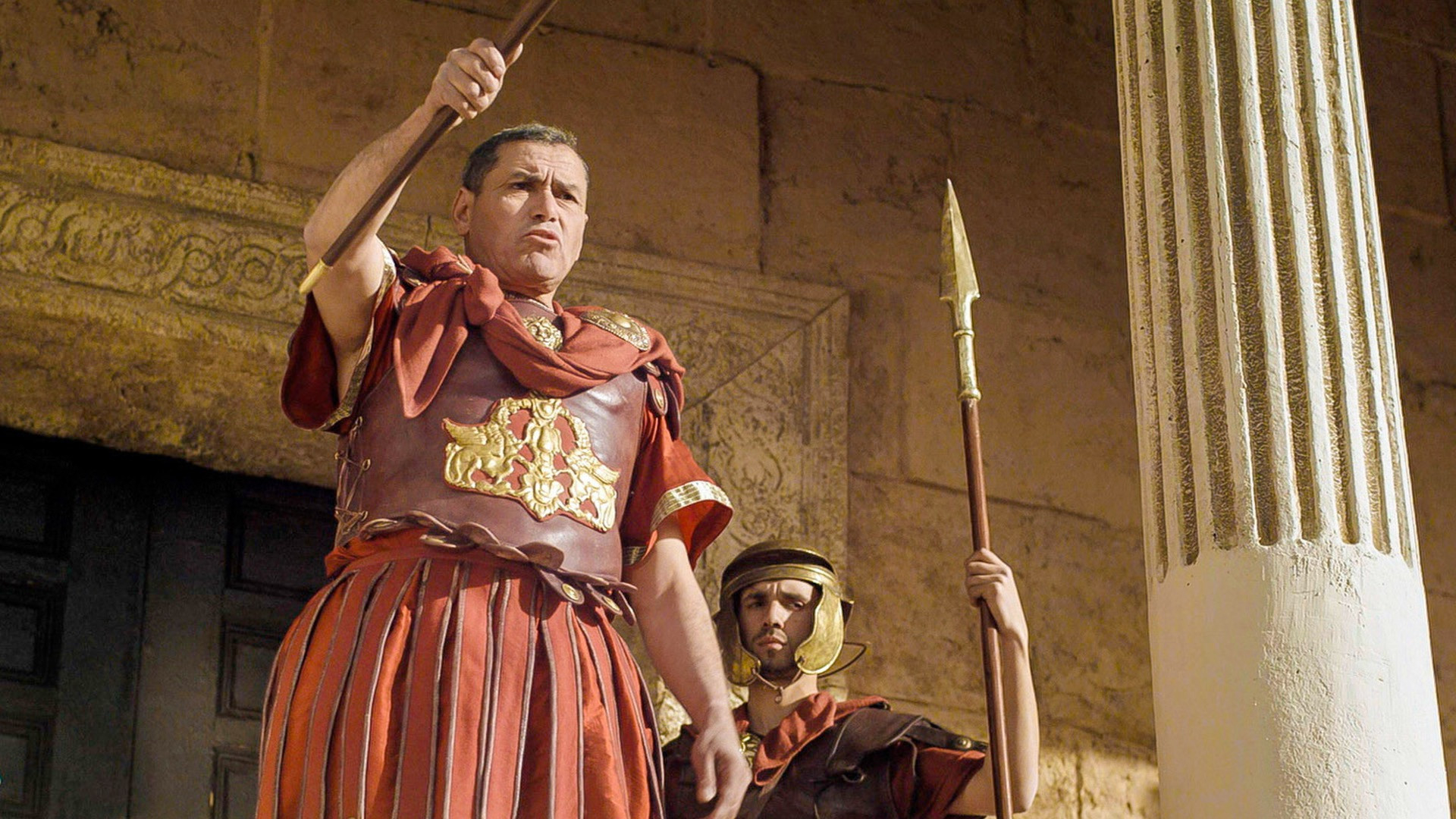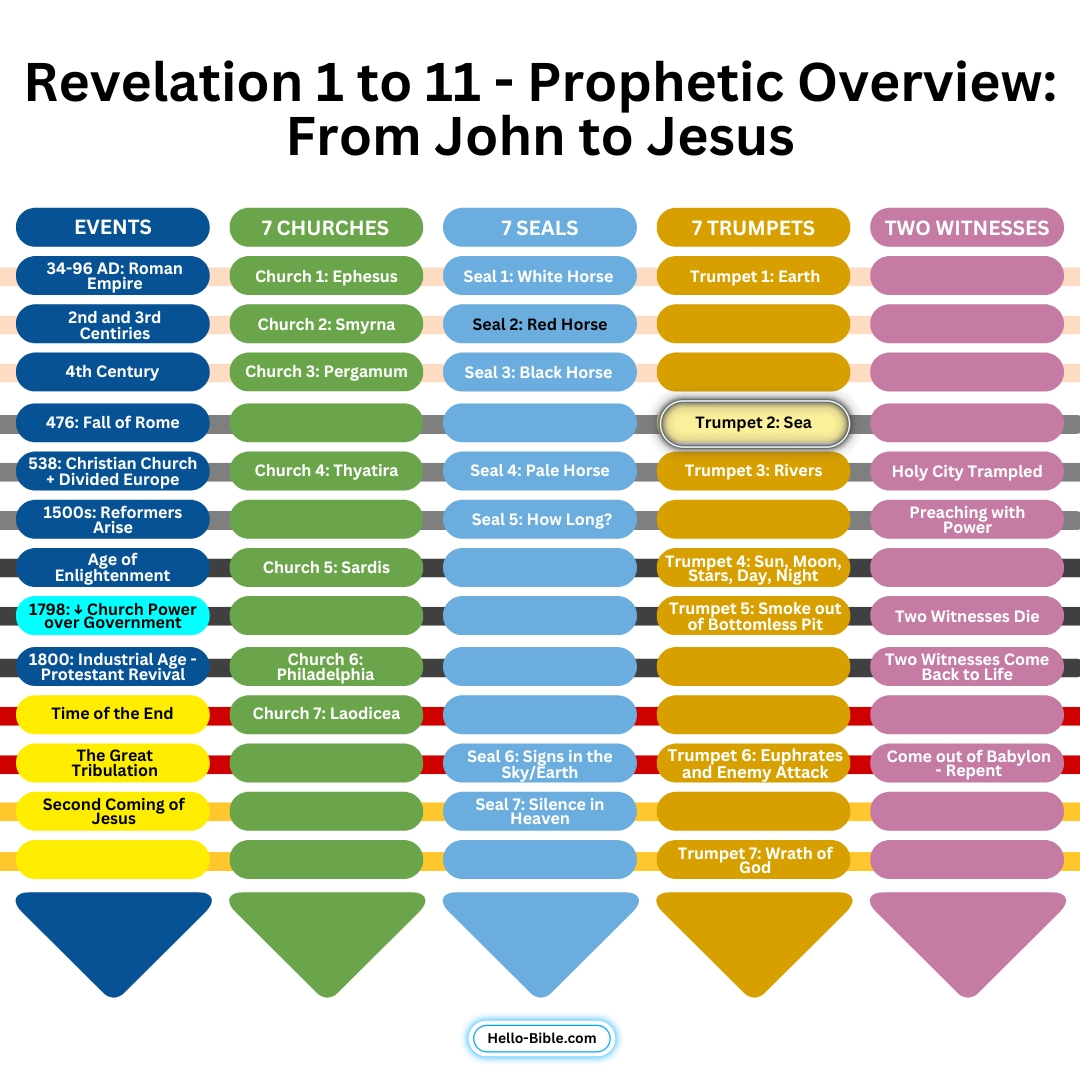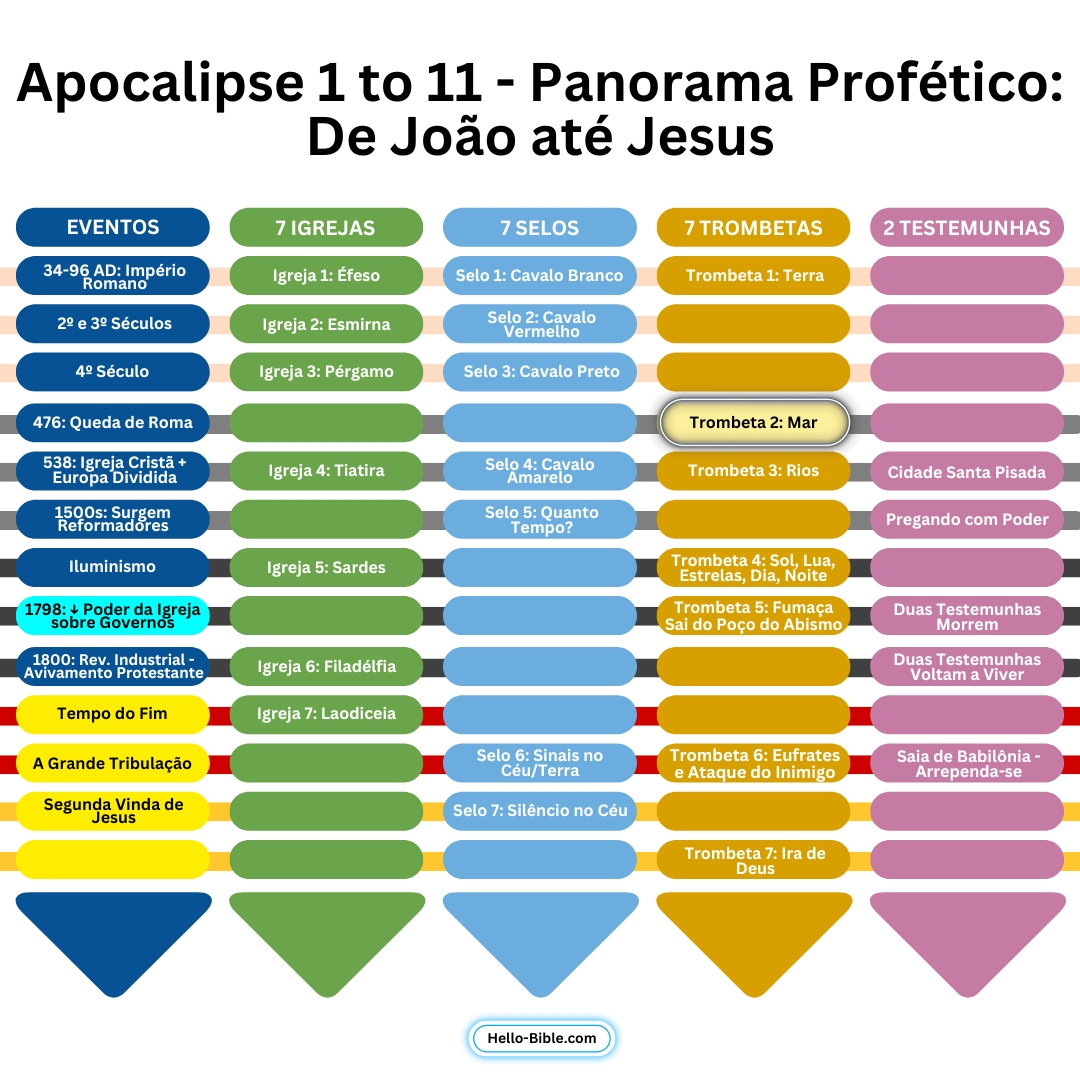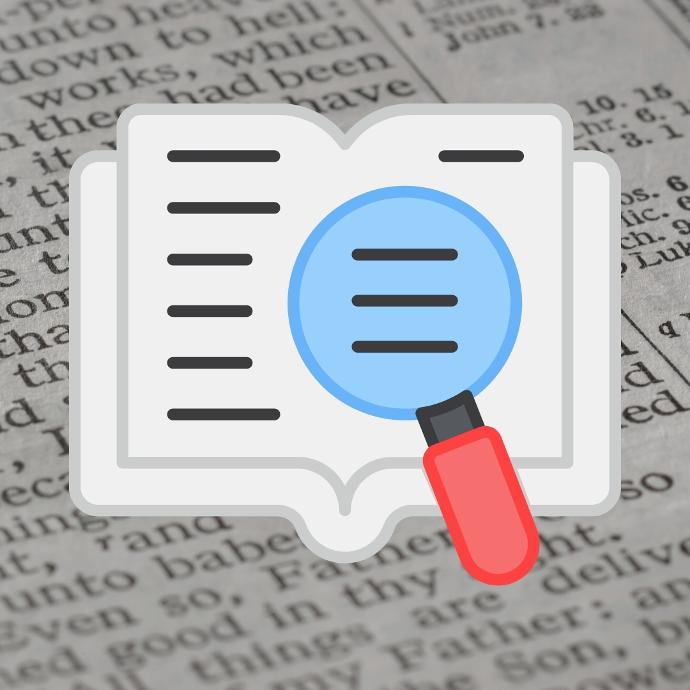Drawing Connections
John had just witnessed the sounding of the first trumpet, which signified the judgment that fell upon Jesus' own people who had rejected Him as Messiah and Savior—those who “received Him not” (John 1:11). Prophetically, this first trumpet corresponds to the destruction of Jerusalem in 70 AD. By the time John wrote the book of Revelation, this prophecy had already been fulfilled. For context, John was exiled to Patmos during the reign of Emperor Domitian (A.D. 81-96) and was released around 96 AD under Emperor Nerva. John understood the principle that “judgment must begin at the house of God” (1 Peter 4:17).
In verse 7, the terms "trees" and "green grass" connect with the expression "one-third" to symbolize those within God's house who had opposed Him. Although opposition to Jesus' followers was widespread, the judgment of the first trumpet did not completely destroy its target. It affected only a portion of the population, "one-third". This suggests that there was still time to respond to the trumpet's call for repentance.
Today we will look at the second trumpet, and discover a mountain that fell on the sea, turning one third of it into blood, killing one third of the marine life, and affecting one third of the ships in the process.
Closer Look
*** A great mountain on fire ***: Once again we have to look back to the Old Testament in order to understand the symbolism used in this verse. The word mountain is often used to refer to a kingdom or empire (Psalm 48:1-2; Psalm 78:68; Isaiah 2:2-3; Isaiah 13:4; Isaiah 31:4; Isaiah 41:15; Jeremiah 17:1-3; Jeremiah 51:24-25; Obadiah 8-9; Daniel 2:35, 44). The kingdom mentioned in Revelation 8:8 is not just any kingdom. It was not only burnt with fire but also cast into the sea. We have now two other elements that should help us narrow down our search for this mountain or empire. The book of Jeremiah has a prophecy against a powerful kingdom, that seems to fit perfectly with the verse in Revelation, as well as with the symbology used in the rest of the book of Revelation. The kingdom referenced as a great mountain was Babylon.
| Bible Passage | Text |
Jeremiah 51:24 | "And I will render unto Babylon and to all the inhabitants of Chaldea all their evil that they have done in Zion in your sight, says the LORD." |
Jeremiah 51:2 | "Behold, I am against you, O destroying mountain, says the LORD, who destroy all the earth: and I will stretch out my hand upon you, and roll you down from the rocks, and will make you a burnt mountain." |
Jeremiah 51:42 | "The sea has come up upon Babylon: she is covered with the multitude of its waves." |
Jeremiah 51:63-64 | "And it shall be, when you have finished reading this book, that you shall bind a stone to it, and cast it into the midst of the Euphrates: And you shall say, Thus shall Babylon sink, and shall not rise from the evil that I will bring upon her: and they shall be weary. Thus far are the words of Jeremiah." |
* Bible version for the tables above: King James 2000 - (Emphasis added)
In this prophecy of Jeremiah, Babylon would be cast into the waters, and sink to never rise again from the punishment God would bring against her. Later in Revelation, John is talking about the spiritual Babylon, and he used the same imagery: “And a mighty angel took up a stone like a great millstone, and cast it into the sea, saying, Thus with violence shall that great city Babylon be thrown down, and shall be found no more at all.” (Revelation 18:21, see also Revelation 14:8). In the time of John, the Babylonian kingdom had already fallen. The trumpets come in sequence. We studied that the first trumpet represented the destruction of Jerusalem, and the judgement brought upon the Jewish nation. The second trumpet portrays something that happened after the destruction of Jerusalem. With this in mind, we can see that mountain was used as a symbol for Babylon, and Babylon is also a symbol for another power - a power that opposes God’s sovereign authority (Revelation 14:8; Revelation 16:19; Revelation 17:5; Revelation 18:2; Revelation 18:5; Revelation 18:10; Revelation 18:21). Also, we are still left with the symbols for fire and water. Let’s look closely into these symbols:
- Babylon: John was not the only one to mention Babylon in his writings. Peter also mentions Babylon as a symbol for the current power in his time: “The church that is at Babylon, elected together with you, greets you; and so does Mark my son.” (1 Peter 5:13) As we mentioned before, there was no more Babylon in the time of Peter and John. Peter referenced ancient Babylon, which was the kingdom responsible for taking the Jewish people into Exile, in the time of Daniel and Jeremiah. Peter and John used, symbolically, the name of their former oppressor to the Jewish nation to refer to their current one: the Roman empire. The early Christians suffered tremendous persecution by the Romans. Many were sentenced to death, thrown onto arenas, and even burnt up alive. Paul suffered this perception first hand, and so did some of the Christians in the churches in Asia Minor (Please see the studies on the Seven Churches: #11 to #27).
- Burning with fire: As we saw in study #52, fire is one of the weapons God uses against the ones who oppress His people. Both the Jewish and Roman leadership persecuted Christ and the early Christian church. The trumpet judgment started “at the house of God” (1 Peter 4:17), and followed with the Roman Empire. God is the one setting the great mountain on fire. In other words, God is the one bringing on His judgement on these nations. God is the one who “removes kings, and sets up kings” (Daniel 2:21).
- The sea: We often find in the Old Testament, the term sea being used as a symbol for the people opposing God (Isaiah 57:20; Isaiah 17:12-13; Jeremiah 51:41-42; Daniel 7:2-7,17). The verse in Revelation and the passage from Jeremiah tell us how the great mountain was to sink and be engulfed in the waters. The demise of the Roman Empire came about on many fronts, such as political, economic, and military. Religious tensions between the Western and Eastern portions of the Empire also aggravated the problem. Waves of barbarian tribes came and swallowed Roman territory.
*** The sea became blood ***: The throwing of the burning mountain on the sea brings about a terrible consequence. The sea turned into blood. The turning of water into blood reminds us of the first Egyptian plague (Exodus 7:14-24). “Thus says the LORD, In this you shall know that I am the LORD: behold, I will strike with the rod that is in my hand upon the waters which are in the river, and they shall be turned to blood. And the fish that are in the river shall die, and the river shall stink; and the Egyptians shall loathe to drink of the water of the river.” (Exodus 7:17-18). In the case of the Egyptians, God wanted the enemy of His people to know that He was the Lord. Once again, we see the redemption aspect of the judgments falling over God’s enemy. God is interested in saving everyone, and He works to give everyone an opportunity to choose to follow Him. As the Roman Empire was sinking deep into the waters, they became covered with blood. The Empire fought many battles during their demise, and bloodshed was abundant.
*** Death of one-third of the sea creatures ***: The consequence of the bloodshed from the battles was the death of one-third of the sea creatures. In study #52, we saw that ‘one-third’ is the incomplete picture of a group of beings (people and even angels). The judgment of the second trumpet was to fall over only part of the sea population. In this case, the marine life is a symbol used to represent the people who lived in those regions of the Empire and neighbouring areas, who were in conflict during the fall of Rome.
*** Destruction of one-third of the ships ***: With the demise of the Roman political order, came economical decline as well. In the Old Testament, ships are mentioned as a reference to a nation’s commercial pride and dominance (Isaiah 2:16-17; Ezekiel 27:25-27). The economic impact was partial, but it was significant and brought with it social devastation.
When the sentence came

Attribution: www.LumoProject.com
*** Prophetic Application ***: With the analysis of each of the symbols used in these two verses of Revelation, we can see that the second trumpet refers to the fall of the Roman Empire in A.D. 476. The prophetic application is strongly embedded in practically every word of the text. The role ancient Rome played in Christ’s crucifixion and in the persecution of the Christians did not go unnoticed by God. It is important that we recognize that the judgments contained in the first and second trumpets did not fall on any one particular individual. They were the consequences applied to the nations. First with the apostate Jewish nation (first trumpet), and then with the Roman Empire (second trumpet). God revealed Himself to those nations and gave them an opportunity to see that He is the Lord, just as He once did with the Egyptian nation during the 10 plagues. God is merciful. God is also just. His justice cannot be avoided. The judgment of the second trumpet is not aimed at God’s faithful people, but that doesn’t mean they didn’t feel the shockwave from the burning mountain falling into the water. The fact that God is dealing justly against His enemies should assure His people that God will never forsake them, and is always ready to defend them.

© Hello-Bible - 2024

© Hello-Bible - 2024
Overview
The second trumpet represents a judgment falling upon the next power that rejected God: the Roman Empire. By comparing the Old and New Testament verses that refer to oppressive ruling powers as "Babylon," and that Babylon is the burning mountain destined to sink beneath the waves, we see that the Roman government in John's time was the next to face judgment from Heaven. The Roman Empire was not overthrown by a single global power dictating religious practices. Instead, it gradually faded into the background, dissolving and morphing into divided kingdoms. This judgment had a partial scope, symbolized by the expression "one-third".
The judgment of the second trumpet wasn't directed at God's faithful people, but that doesn't mean they were untouched by the socio-political and economic shockwaves caused by the falling, burning mountain. However, the fact that God deals justly with His enemies should reassure His people that He will never forsake them and is always ready to defend them. Just as God made sure the Israelites knew He was the one freeing them from Egypt (Exodus 20:2), He also showed the Egyptians the same truth through the plagues—stripping away the things they had placed above Him so that they might know He is the Lord (Exodus 7:5) and the One who rescues His people from bondage.
What a profound message we see here! When God removes us from the pedestal that only He should occupy, it’s an opportunity for us to repent and turn back to Him. True life comes only when we allow Him to be the center. He desires us to have abundant life (John 10:10). If we decide to not complete the journey back to Him, our removal from the center will lead to final judgment. However, that choice is ours, and He will never force us to choose His side.
